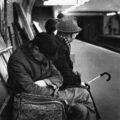Title
Not Yet Written Stories An Introduction
https://miejsce.asp.waw.pl/en/not-yet-written-stories/
The articles in this issue of “Place” are based on the papers presented at the conference Not Yet Written. Women Artists in Central and Eastern Europe, which was held on September 2–3, 2021, via online platforms. The conference was organized by the Arton Foundation (Warsaw), the Latvian Center for Contemporary Arts (Riga), SCCA-Ljubljana, the Center for Contemporary Arts, (Ljubljana), and the Office for Photography (Zagreb). The Conference Organising Committee comprises: Barbara Borčić, Sandra Križić Roban, Marika Kuźmicz, Lana Lovrenčić, and Andra Silapētere.
The scholarly sin of omission, and the exclusion of works by women from the canon of art history have resulted in the erasure of the achievements of numerous women artists. Such “amnesia” in history writing processes has been widespread and has been happening regardless of the socio-political situation. However, women artists as well as art historians, critics, curators and gallerists in culturally and economically “peripheral” countries, such as those behind the Iron Curtain, and in the former Yugoslavia, have been at risk of double exclusion on the grounds of both geography and gender. In parallel to the development of new states and socialist societies after WW2, women built themselves up not only politically and culturally, but also artistically. Nevertheless, instead of the anticipated advancement of women in various fields, society and its power structures continued to support the traditionally predominant patriarchal view.
To counteract that situation, the Arton Foundation (Warsaw), the Latvian Centre for Contemporary Arts (Riga), SCCA Ljubljana, Center for Contemporary Arts (Ljubljana), and the Office for Photography (Zagreb) in 2019 collectively launched the project Stories Not Yet Written: Women Artists’ Archives On-line. It focuses on women artists from Poland, Latvia, Croatia and Slovenia in order to raise awareness of recent historical events in Central and Eastern Europe and consequently stimulate new readings of history. The project not only maps regional contexts and collaborations, but also aims to reconsider common points of history-writing processes while investigating gender in a social, political, cultural, and artistic context within Central and Eastern Europe. Taking this project as the starting point, the partners organized a conference entitled Stories Not Yet Written. Women Artists in Central and Eastern Europe. The conference presented a wide context of the roles of women in the arts and culture with papers reflecting the topics in twelve countries, from Latvia to Bulgaria and from Ukraine to Croatia.
A similar objective is set forth in this issue of “Place.”
The two-day conference comprised six panels devoted to issues such as the work of seven women artists in the field of both new media and textiles, for example, women’s artistic education, socially and politically engaged art, and many others.
The conference was inaugurated with a lecture by Professor Leonida Kovač entitled Subversion of the normative heterosexuality in the self-representational works of Nasta Rojc. The accompanying events included the screening of Sonja Savić’s films and a performance by Ana Čigon entitled Dear Ladies, Thank you (2011–2013).
The project was part of the Creative Europe program, co-financed by the Polish Ministry of Culture, National Heritage and Sport.













